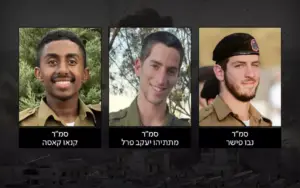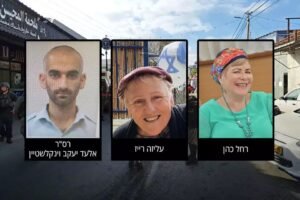I don’t think we’ll ever grow tired of getting WhatsApp messages from IDF commanders with the news that the helmets, cameras, drones, or other gear we bought saved a soldier’s life or helped locate terrorists—but the message my husband and I received after Shabbat last week was different.
It was forty soldiers.
But when we talk about forty soldiers, it’s not just forty men in uniform marching to orders. It’s not either forty heroes battling an enemy so that we can sleep at night, safely in our beds. It’s forty brothers in our tiny family.
Two weeks earlier, my husband brought a special fireproof Tefillin case to the younger brother of his close childhood friend. Dov Igbi is the little brother of the type of friend who twenty years later, and a few continents over, still calls every few weeks to catch up, and still shares secrets and concerns, heart to heart.
Dov is in the IDF reserves, and his unit was being transferred to fight Hamas in the center of Gaza. He makes sure to pray with his Tefillin every day, and wanted a special case to ensure that the fragile texts don’t get ruined between the heavy fire.
There’s always an awe and pride in our soldiers, along with a concern and worry that we try to shove down to the bottom of our throats. My husband wished him the best, and that G-d watch over him, before seeing him go off to Gaza.
The message we received a few days later was from Dov’s commander. He was exuberant, perhaps in a mixture of shock and gratitude to be standing at all. His unit had just arrived at a mission point in Gaza, and were setting up base in an abandoned building. Forty soldiers spread out on two floors and got to work covering up windows, and drilling sniper holes.
The unit scout took out the drone and began to search the extended area, taking an extra close look in and around buildings in the distance. We had purchased the drone with extra funds from donations from my readers, and sent it to the unit a few days earlier. It was a budget drone—the Mini Pro 4–but it did the job.
After a minute of searching, the soldier spotted a Hamas terrorist with an anti-tank missile aimed directly at the building where forty soldiers were settling in. He was close enough that the hit would be certain disaster.
The scout immediately called to the team sniper, pointed the position, and eliminated the terrorist. They then called in an air strike to remove the missile and launcher. Thank G-d, the drone saved them.
Forty soldiers. One was Dov, but all of them were brothers.
A few days later, half of the unit was out on a break, in a base nearby. My husband and I, and Alice, who is our team drone expert, went to see how they were doing, and learn more about the use of drones in battle.
It was a makeshift army base for reserve units. Past the improvised security gates were rows of large sandy tents, lined with military cots that looked less comfortable than a bed of nails. In the back of one tent stood a fridge with a glass door, revealing rows of chocolate pudding and soft drinks.
The company commander invited us to sit around a small table with a group of reservists from a squad of 20, and hear their first-hand experiences.
One of them looked familiar. He introduced himself as Naftali, and I instantly knew it. “Naftali Isaacs! Your father was my fourth grade teacher in Vancouver, Canada, 20 years ago! You were in my older brother’s class!”
Naftali is the squad’s communications commander. He wears a vest laden with supplies and radio equipment that weighs at least 100lbs all together. In civilian life he’s a budding chef with an Instagram page that’ll make anyone hungry. He’s also the most vocal of the group.
Across from him sat the squad commander, who they all jokingly referred to as their rabbi. Rabbi Amit Listentover is the assistant principal of a large religious boys school in Jerusalem, and is the father of six kids. He’s exempt from reserve duty, but showed up anyway, for all five months that his unit was called for. He feels a responsibility towards his unit, who learned to look up to him as the commander over their many years of reserve duty together.
“It’s not easy,” he confessed. “My wife is struggling on her own, and my kids send me messages every day asking me to come home. My school is missing so many teachers, and I’m supposed to be arranging the classes for next year.”
He played a voice message from his four-year-old, “Abba, come home today, please. I miss you Abba.”
Next to Amit sat Tzvika, whose wife is seven months pregnant with their first child, and made him promise to come home before her ninth month so that he doesn’t miss the birth. Noam, on the other side of the table, told him that he can’t miss it for anything. Noam’s wife gave birth just before the war broke out, and now he’s missing all of his daughter’s first milestones: first laugh, first real food, first time crawling. He hopes to at least be home for her first steps. Pinchas chimed in to remind them how lucky their families are; they at least have relatives to help and support them. He is an immigrant from France, and his wife is home alone with four kids and no help.
While everyone discussed their families, Assah pulled out his laptop—he’s a computer science student, but hasn’t been able to go to class. He now studies virtually, in between battles.
The group started the war off in the north, where they guarded the border with Lebanon, and was recently moved to Central Gaza where they carry out missions along the Netzarim Corridor. Gaza has been a very different experience.
“Hamas embedded themselves so deeply in Gaza,” Noam explained. “Yesterday a man came up to us with an elderly woman. She was crying that she’s thirsty, and walked with a limp. The man told us that he needs to take her into the humanitarian zone, and we need to let him cross the corridor with her. It was very pitiful. But then we checked the face recognition system, and found that he was a Hamas commander. It’s the same thing again and again; a few days earlier it was another terrorist, but with a group of small children and no mother. We had to take the kids over ourselves.”
Noam is considered the group leftist. They have political discussions often, especially when they were in the north on guard duty. “We argue about politics plenty,” Naftali says, “but like brothers. After a heated debate, we laugh and move on, no grudges held.”
Noam and Amit had made a bet, back when they were in the north. Noam thought the government would give in, and there wouldn’t be a Rafah operation. Amit bet them they would. A deal was made: If the IDF entered Rafah, Noam would put on tefillin every day for a month. If not, Amit would have to donate a thousand shekel to B’tselem, a far-left organization. Amit felt the risk was worth seeing Noam in tefillin.
The brotherly-bond goes far deeper than bets and light-hearted debate. Naftali pointed to two younger reservists who sat quietly on the other side of the tent. “We worry about them a lot.”
Ben and Or are the youngest of the group. They had just completed their mandatory service at the Nachal Oz outpost a month before the war began. On October 7th they lost 18 friends who they had served with, including three who were close childhood friends.
“Everywhere we go,” Assah said, “we make a memorial for all the friends we lost during the war. We weren’t able to go to any of their funerals, but we can’t forget them.”
Some of the more senior reservists said that they see therapists to deal with the pain, but wish that more of the younger ones did. “They will when they’re ready,” Naftali said. “We just need to keep supporting them until they get there.”
This brought us back to discussing the drones. Naftali got straight to the point. “It’s either a drone, or a soldier. We have to inspect almost every single building. If there’s a trap, say armed terrorists waiting behind the door, or a bomb ready to go off—who do you want going in first? A drone, or one of us?”
I looked around the table, they were all nodding solemnly. Tzvika continued, “We lost three drones since the beginning of the war. Each drone was worth 7,000 shekel and was destroyed in a booby-trapped building. But if one of us had gone in first instead of the drone, we would have been in its place.”
That was blunt. I looked at Tzvika and imagined his pregnant wife, waiting for him at home.
The soldiers had only been in Gaza for a couple weeks, but already had dozens of drone stories. A drone searching an alley found an ambush waiting for them, a drone searching a building found traps, and another found a terrorist jumping into a tunnel. They also had stories with no drones.
“Last week my friend, who is a sniper, got hit by an RPG and was seriously injured,” Naftali said. “His unit doesn’t have a drone. I’m sure they would have found the terrorist if they did, and my friend wouldn’t be in the ICU.”
Drones funded by civilians have slowly been filling up the battlefield, and changing the rules on ground. The soldiers are certain that the daily IDF death-toll dropped significantly because of the drones.
A simple drone costs 7,000 shekel, and a more advanced drone with night vision costs up of 22,000 shekel. The IDF bought a very limited number for a few elite units, but not for every unit and squad, which the combat commanders are all saying is necessary. While the reason isn’t known for sure, there is speculation. Most drones are made in China, and even though the software in every drone used by the IDF is re-written, and reformatted to fit the IDF’s GPS system, the IDF can’t be seen purchasing from China. Other drones are made in the U.S., where the IDF has a military trade agreement. Some speculate that the Biden administration doesn’t want the IDF using drones, since it leads to more buildings being destroyed by airstrikes, instead of the terrorists being eliminated in gun battles.
“Listen,” Amit said. “We’re here to fight for our nation’s survival. We left our families for half a year so that they can live a whole life in security. I don’t want my kids or students to have to fight or mourn a single day like we do. We will do whatever we need to, with whatever we have.”
We sat around talking for two hours, my husband, Alice, and I, listening to their stories. A group of soldiers turned into a group of brothers. Each who need to return to their loved ones whole; and in our hands the power to do something to help make that happen.
——
Since the beginning of the war, we bought 140 drones with donations from our readers and other friends around the world. We’re now at a critical moment in the war, and have urgent requests from IDF company commanders for 85 drones. After Gaza, the drones will be used in Lebanon if a wider war starts with Hezbollah. Each drone is estimated to save the life of at least one IDF soldier, but usually more.
Last week we saved 40 lives in one go. Let’s save hundreds more. The goal is ambitious, but we’re a strong team—we can do it!






